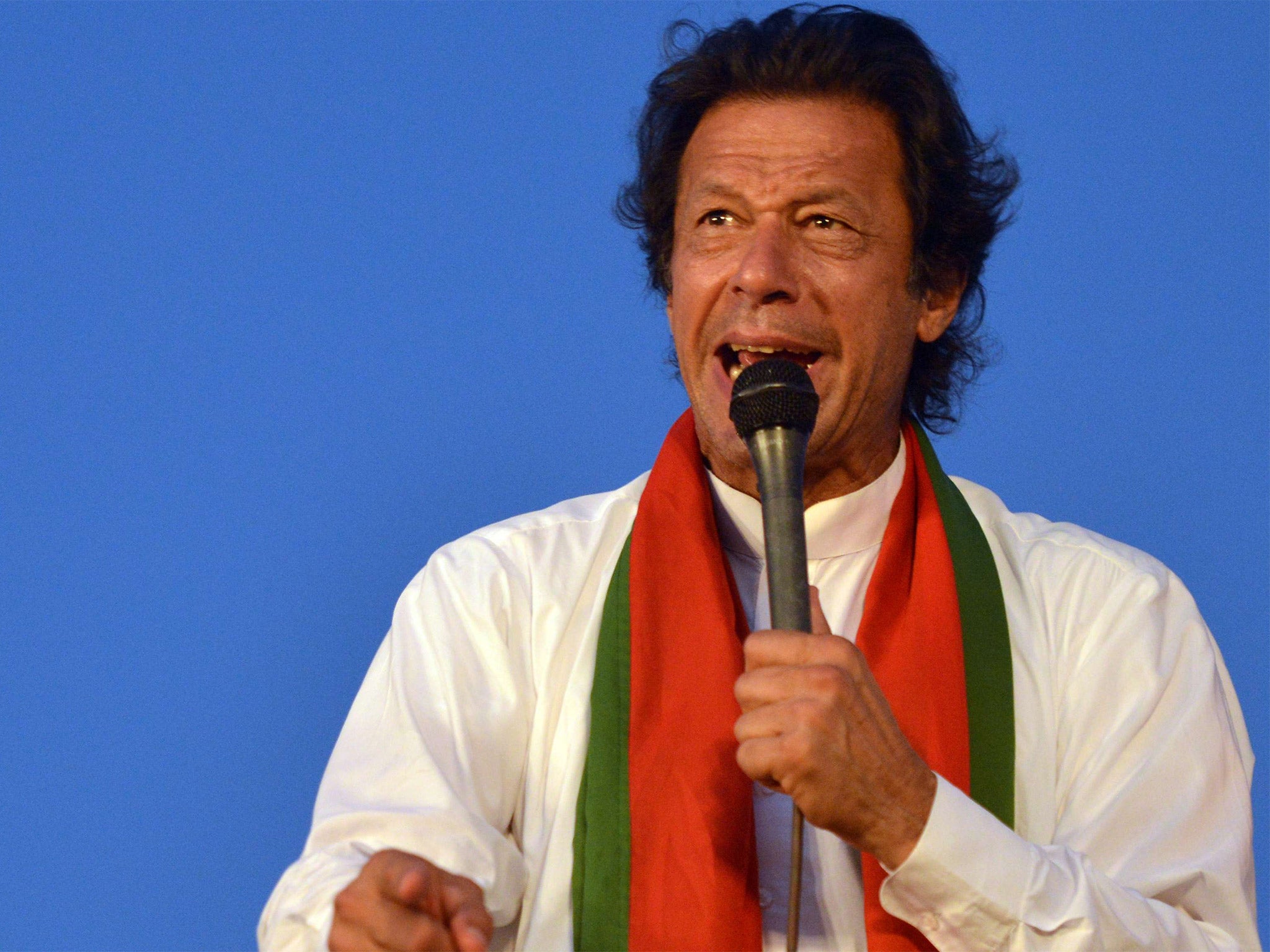It looks like Imran Khan is about to become Pakistan's prime minister – here's what we can expect of him
Even a genuinely reformist candidate in the state has to find some kind of accommodation with the military – but that appeasement also carries the risk that the occupant of the presidential palace will find his middle class followers disillusioned

It is tempting to see the rise of Imran Khan in Pakistan as a sort of counterpart to the En Marche! phenomenon in France that propelled Emmanuel Macron to power. As Mr Khan enjoys a surge in support for his party, Pakistan Tehreek-e-Insaf (Pakistan Movement for Justice, or PTI), and every chance of winning the elections this week, there are some parallels between the young French president and the youthful (though 65-year-old) Mr Khan.
Mr Khan enjoys a legendary charisma, mostly born of his cricketing prowess, as if Gareth Southgate or Harry Kane were running to be prime minister of Britain. We know him in Britain too as the former husband of Jemima Goldsmith, and thus brother-in-law to her brother Zac.
He has glamour, then, and a common touch that has seen his party make inroads in the populous Punjab, without which none can rule in Pakistan. Mr Khan has also made radical, reformist noises, pledged to rid his land of endemic corruption, and, more predictably, attacked the United States from its drone powered incursions into the Islamic Republic’s territory.
Mr Khan, in other words, promises much, and, like Mr Macron, founded and still leads his own political party, which at times is not much more than a fan club for its handsome head. (Though the basically populist PTI is much older than En Marche!)
Mr Khan and the PTI has done well in recent years in building support, mainly at the expense of two older parties, the vaguely progressive Pakistan Peoples Party, currently led by another member of the Bhutto dynasty, and the more conservative Pakistan Muslim League – Nawaz (PML-N), whose ex-leader, and former prime minister, Nawaz Sharif, was recently jailed on corruption charges.
All, however, is not what it seems. Mr Khan is widely regarded as being an ally of what remains the most powerful institution in the country and the only one, according to Mr Khan, that functions effectively – the army.
The generals, a ruthless though stabilising force in Pakistani society, are reportedly “pre-rigging” the election in Mr Khan’s favour, including the arrest of Sharif (which is not to say that the move was unjust). It seems that the PTI has suffered less from electoral violence than some of its rivals, including a terror attack at a rally in Baluchistan that killed 149 people.

Condemning corruption is not consistent with being cosy with the Pakistani army, a body that controls substantial chunks of the economy and has plenty of money and the muscle to get its way, on a national scale and by way of kickbacks and petty corruption and abuse of power. The army has frequently intervened in Pakistani politics, subverted democracy, and collaborated with religious extremists, including the Taliban in the 1980s, when young men such as Osama bin Laden were based there to fight America’s proxy war against the Soviet Union in Afghanistan.
The legacy of that haunts Pakistan to this day. The result is that even a genuinely reformist candidate in the state has to find some kind of accommodation with the military; but that appeasement also carries the risk that the occupant of the presidential palace will find his middle class followers disillusioned. If he chooses instead to challenge the army, then, like Mr Sharif, he may find himself more or less gently deposed.
Pakistan’s endemic problems with graft and corruption go a long way to explaining its long-term disappointing economic performance, despite a recent spate of growth. That matters in a predominantly young nation of some 200 million, and which must look with envy at what its neighbours India and China have been able to achieve in recent decades.
If Mr Khan is unable to do much about the corruption, then he will find the economy works way below its potential, and foreign investors, already wary of political instability and the backwash of violence from Afghanistan, will prefer to put their euros, yen and dollars into India.
Without economic growth, better public infrastructure, and opportunities, unemployment, health and education are harder to come by. Pakistan’s severe social problems, including the treatment of women and human rights generally, will remain intractable without money, something Mr Khan, a prominent philanthropist, at least shows awareness of.
Last, Mr Khan is no better placed to deal with tribalism than his rivals. He too enjoys a regional base of support in Punjab, and has had to rely on old-school defecting politicians from other parties and prominent families to bolster his support. He optimistically describes these mercenary politicians as “electables”, though corruptibles might be a better sobriquet.
Pakistan, then, may change under Mr Khan, and for the better, but it will take formidable skill to make this happen. Mr Khan has won for Pakistan many times on the cricket pitch; he will find his new job a much stickier wicket.
Join our commenting forum
Join thought-provoking conversations, follow other Independent readers and see their replies
Comments
Bookmark popover
Removed from bookmarks